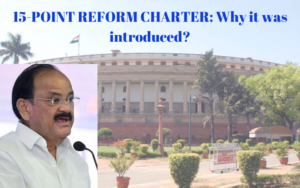15-POINT REFORM CHARTER: Why it was introduced?
All About the 15-point reform charter, who launched it, what are the basic points, concerns
Vice President Venkaiah Naidu has unveiled a 15-point reform charter while expressing concern over the functioning of parliamentary institutions in the country and erosion of public trust in them.
This is to serve as the basis for a new political normal to enable effective functioning of the Parliament and State Legislatures.
Read more: Administrative Changes after the revolt of 1857

The 15-point charter includes:
- Parties need to ensure attendance of at least 50% of their legislators all through the proceedings of the Houses by adopting a roster system.
- Review of the anti-defection law.
- Review of the whip system which is “stifling reasonable dissent even on non-consequential matters”.
- Set up special courts for time-bound adjudication of criminal complaints against legislators.
- Pre and post legislative impact assessment.
- Address the problem of the rising number of legislators with criminal background.
- Governments should be responsive to opposition and opposition to be responsible and constructive while resorting to available parliamentary instruments
- Consensus on the proposal for simultaneous elections.
- Steps should be taken for the effective functioning of the Parliamentary Committees.
- The representation of women in legislatures need to be raised.
Challenges Ahead-
Below are the Challenges which are to be faced by our nation instead of the charter-
- The declining number of sittings of legislatures.
- Persistent disruptions.
- Declining quality of debates.
- The growing number of legislatures with criminal records.
- The high degree of absenteeism.
- Inadequate representation of women.
- Rising money and muscle power in elections.
- Lack of inner democracy in the functioning of the political parties.
- Poor knowledge, low argumentative power of the masses, negative influences of poverty and economic disparities.
- Faulty ‘First Pass the Post (FPTP) election system.
- Society’s perpetual habit of accepting all permeable state to control public and private affairs.
Our founding fathers of the Constitution have assigned a pivotal role to the Parliament as an institution. Yet, so many decades later, it has neither evolved nor matured as it could, might or should have. If anything, slowly but surely, it has diminished in stature and significance.
However, in today’s scenario, it is now more a symbol than the substance of a vibrant democracy that has taken deep roots among our people. The time has come for citizens, whom it represents, to evaluate that performance.
For more such informative articles stay tuned to OWN TV.
